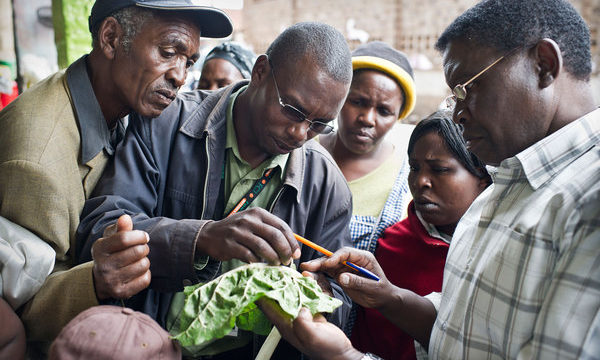This blog post is different to those you might usually read on the Plantwise blog. It is a little tour behind the scenes of the Plantwise Knowledge Bank, telling you about how we design features for our website and mobile. Let us know if you’re interested in hearing more about how we develop the Knowledge Bank, either in the comments below or via plantwise@cabi.org
The Plantwise Knowledge Bank team provides tools and content both online and offline to assist in the development of fully functioning plant health systems in developing countries. Over the past couple of years, much of our IT development has focussed on the Plantwise Online Management System (POMS), a secure website that countries can use to record administrative information relating to their plant health system, track progress towards annual targets, and store, view and analyse data from plant clinics.
We often use Balsamiq Mockups or myBalsamiq for creating mockups and wireframes. Licenses are free for not-for-profit organisations and other do-gooders.
Providing the outcomes of validation on plant clinic data
Several Plantwise countries have a national data validation and analysis team that meets to review the data that has been collected at plant clinics. POMS already has a page where users can view analyses of the data, or download it to conduct their own analyses. Last year we designed a new page that shows the outcomes of data validation as a dashboard to present the quality and validity of diagnoses and recommendations made by plant doctors. A series of tables and graphs highlight these validation outcomes and allow the users to download data for further investigation.
Tools used:
- Balsamiq Mockups for producing the mockup
- Microsoft Excel for mocking up graphs
Adding a more detailed plant clinic schedule
The Clinics page of POMS allows users to record, edit and download information relating to plant clinics. The clinic schedule section originally only gave a limited number of session frequency options (e.g. every week or every month but without options to specify frequencies such as ‘every second Thursday of the month’ or ‘the 4th of every month’). The images below show how this section was developed to provide more options.
Tool used:
- Balsamiq Mockups for producing the mockup and annotations
- Inspiration for how to allow user to select different clinic session frequencies
- Mockups of how the clinic schedule options should look
- The clinic schedule section of the form on POMS
Filtering country clinic data analyses by plant clinic
The POMS provides a page where users can view ready-made analyses of their country’s plant clinic data. This originally gave an overview for the entire country so we added the option to filter by specific clinics (identified by a clinic code). In the future, it might be possible to filter by named groups of clinics.
Tools used:
- Windows Snipping Tool for capturing screenshots
- GIMP for editing screenshots
- Skitch for adding annotations
Investigating user requirements for a plant doctor data collection app
The Plantwise e-plant clinic pilot has been running in Kenya for a year, and similar pilots are due to be started in Rwanda, India and Sri Lanka this year. We have been using an off-the-shelf data collection app to test the e-plant clinic concept and are now investigating the option of designing our own bespoke app. In order to investigate user requirements of the plant doctors, we have created some wireframes of how the data collection app might look.
Tool used:
- myBalsamiq for collaborating on wireframe design within our team
- How a plant doctor might select the part of the plant that has been affected
- The screen that might show once a plant doctor has sent an SMS recommendation to the farmer
3 Comments
Leave a Reply
Related News & Blogs
Agricultural mobile apps strengthening agricultural extension
CABI’s range of agricultural mobile apps provides a way for smallholders to access up-to-date, real-time information, either first-hand or through advisory services. Smallholder farmers across the world need access to agricultural advice so their crops…
30 May 2022












Informative & encouraging.
This is an informative and interesting article especially about the plantwise e clinic even though it is a pilot at the moment considering interests in such subject matter.
[…] Mocking up the Plantwise Knowledge Bank – PlantWise […]